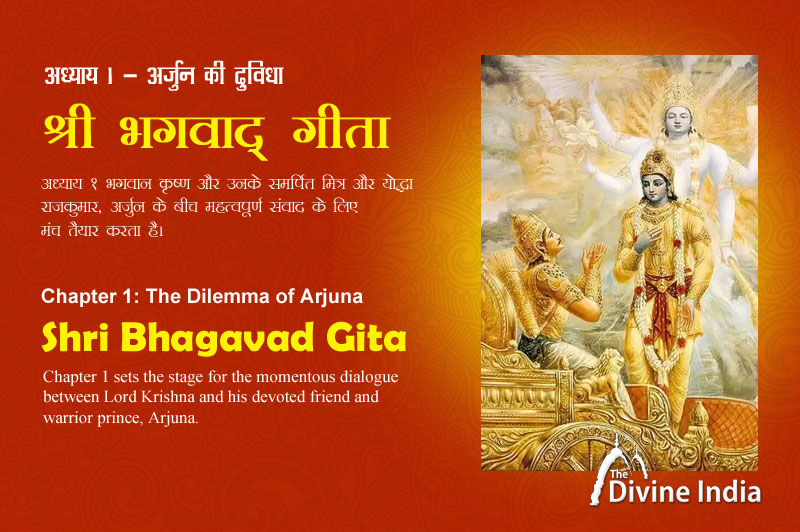


The Bhagavad Gita, often referred to as the Gita, is a sacred Hindu scripture that consists of 18 chapters, with each chapter delivering profound philosophical insights and spiritual wisdom. Chapter 1 sets the stage for the momentous dialogue between Lord Krishna and his devoted friend and warrior prince, Arjuna.
Chapter 1, titled "Arjuna Vishada Yoga" or "The Yoga of Arjuna's Dejection," unfolds on the battlefield of Kurukshetra, where the great war between the Kauravas and the Pandavas is about to begin. As the conch shells are blown, signaling the commencement of the war, Arjuna, who is seated in his chariot, finds himself engulfed in a sea of conflicting emotions.
As the battle is about to commence, Arjuna is overcome with doubt, sorrow, and moral dilemma. He is torn between his duty as a warrior (Kshatriya) and his emotions as a family member. On the opposing side, he sees his beloved relatives, respected elders, and revered teachers ready to engage in battle. The weight of the impending loss of lives weighs heavily on his heart, and he questions the righteousness of the war.
In the face of this inner turmoil, Arjuna lays down his bow and arrows, expressing his unwillingness to fight. He addresses Lord Krishna, who stands as his charioteer, seeking guidance and enlightenment. Arjuna's dilemma represents the universal human struggle between duty (Dharma) and emotion, and the conflict between righteousness and personal attachments.
Lord Krishna, as the divine charioteer and the epitome of wisdom and compassion, gently listens to Arjuna's concerns. He understands the complexity of Arjuna's emotions and the depth of his inner conflict. Krishna recognizes that Arjuna's hesitation arises from his love and compassion for his family and friends on the opposite side of the battle.
In response to Arjuna's despondency, Lord Krishna commences the divine discourse, which forms the core of the Bhagavad Gita. Through the teachings, Krishna imparts profound philosophical wisdom and spiritual knowledge that transcends time and place.
Dharma: The concept of duty and righteousness is a prominent theme in the chapter. Krishna will later elaborate on the importance of fulfilling one's duty, regardless of the outcomes, and the significance of acting selflessly.
Renunciation: Arjuna's initial act of renunciation by putting down his weapons represents the state of confusion that arises from attachment and desire.
Compassion: Arjuna's compassion and empathy for his family members demonstrate the human aspect of the dilemma faced by warriors in the battlefield.
Chapter 1 of the Bhagavad Gita serves as an introduction to the grand philosophical discourse that follows. Arjuna's inner turmoil sets the stage for the profound teachings of Lord Krishna. The Gita addresses not only the practical dilemmas faced by a warrior but also the timeless conflicts experienced by every human being on the journey of life. It highlights the importance of moral integrity, selflessness, and detachment, while emphasizing the path to spiritual enlightenment and inner harmony.